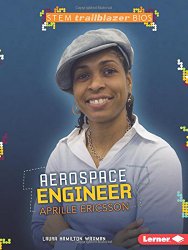Aerospace Engineer Aprille Ericsson (STEM Trailblazer Bios)
by Laura Hamilton Waxman (Author)
Booktalk: Have you ever built a cool science project? In middle school, Aprille Ericsson won second place in a science fair. She knew she wanted to keep creating amazing science projects. As an adult, she became an engineer and works at NASA building spacecraft.
Ericsson was one of the few girls in her middle school who loved math and science. Years later, she became the first woman to receive a PhD in mechanical engineering from Howard University. At NASA, she’s helped build spacecraft that can map the moon, monitor climate change, or even bring soil and rocks back from Mars. Learn how Ericsson’s passion for science has helped her pave the way for future engineers.
Snippet: One of Ericsson’s most recent projects will help scientists study the Earth’s polar caps. Greenhouse gasses are warming the North and South poles. The warmer temperatures are causing the ice caps to melt slowly. Scientists will soon be able to find out more with the new Ice, Cloud, and Land Elevation Satellite (ICESat-2). Ericsson was one of the managers in charge of creating a large instrument for ICESat-2 called ATLAS (Advanced Topographic Laser Altimeter System). The device wil be attached to ICESat-2 and will use lasers to measure the size of the ice caps. ICESat-2 is scheduled to launch in 2016.
See how the lasers will measure the size of the ice caps for ICESat-2 at Goddard Space Flight Center’s ICESat-2 page Goddard Space Flight Center page.
We’re all fired up! The ATLAS team turned on Laser 1 yesterday, the 1st time since it’s installation @NASAGoddard pic.twitter.com/Qz4Ye9XgoY
— ICESat-2 (@NASA_ICESat2) July 23, 2015
See more photos at @NASA_ICESat2
It’s Nonfiction Monday!
Copyright © 2015 Anastasia Suen All Rights Reserved.


